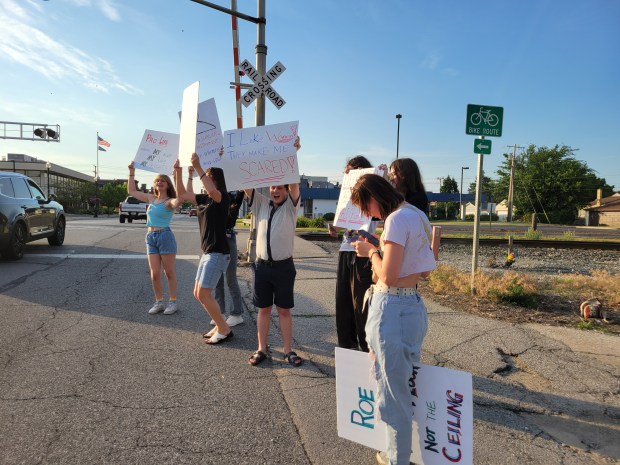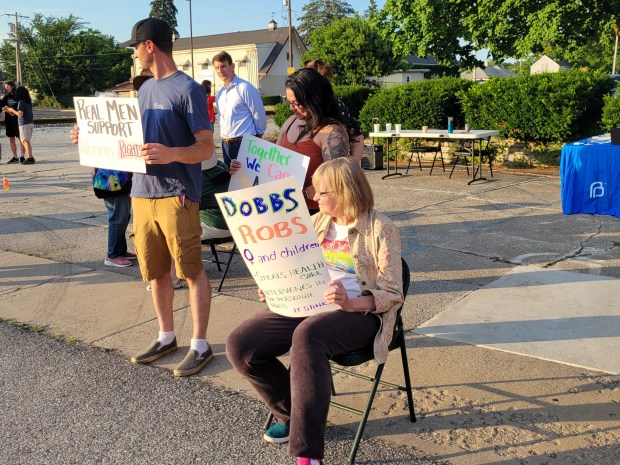Gail Thomas was a young mother in 1973 and wasn’t necessarily paying attention when the verdict in Roe v. Wade was handed down because she never believed she’d need to.
And when she ended up having an abortion later that decade, there were no regrets at all. In fact, she said, it made her stronger.
“We’re pissed off,” Thomas said disgustedly as she and around 40 other men and women gathered in front of the First Unitarian Church of Hobart Tuesday on the second anniversary of the Dobbs ruling that overturned abortion rights. “More women are going to lose their lives.”
Songs depicting women’s empowerment blared as the crowd stood out in front of the church talking about the two years since the Dobbs ruling. Michelle Borrell, secretary for the church’s Faith in Action committee, said they’re mostly trying to get people out to vote. She noted that her own daughter “has fewer rights than she did.”
“We as individuals own our own bodies, and that encompasses reproductive rights,” Borrell said. “Thank God we live in Indiana, because at least we’re close to states where reproductive rights are still intact and we don’t have that far to drive.”
Lack of transportation is something of which Thomas is way more aware now than she was before, she said. And she knows the horror stories of women without reasonable access are coming.

Julie Storbeck, president of Indiana NOW, asked the crowd who owns them.
“The State of Indiana owns your body right now. Are you Ok with that? Hell no,” she said. “Nine people elected by no one have full determination over whether you live or die. Why do we have to be violently violated before we can have care? How close to death do we have to be before we can get care? One-third of our counties (in Indiana) have no OB/GYN services because doctors have to go through hospital attorneys for them to decide if we’re sick enough to receive the care we need.
“I’m not Ok with any of this crap, and we can stand here and do all these protests — and they’re great — but if people don’t show up to vote, none of it matters. They’re coming for all of us.”
A couple from St. John asked that their names not be used because they’re surrounded by anti-abortion supporters in their neighborhood. The woman said she had an abortion when she was a teen in the 1970s because birth control failed for her.
“I was 19 and working at Kentucky Fried Chicken. How was I going to provide for myself, let alone a child?” she said.
Her husband, who’s originally from The Netherlands, noted that anti-abortion supporters are “inconsistent.”
“They talk about life, but then you ask them about the death penalty, and they support that. How does that work?” he said. “America is very advanced technologically, but socially, it’s sadly the 1800s.”
U.S. Rep. Frank J. Mrvan, D-Highland, reminded the crowd that Indiana was the first state to impose a full abortion ban after Dobbs was handed down.
“When a government takes away your rights, they don’t give them back unless you stand up and get them back,” he said. “This life-sustaining decision is on the ballot.”
Josh Thormann, of Hobart, was coming home from work when he saw the protest happening. He grabbed his wife, Reginia, and biked on down to join them.
The couple decided early on they don’t want children, but because birth control wasn’t a good option for Reginia, Josh took it upon himself to have a vasectomy, she told the crowd.
Chris Letcher, 18, of Crown Point, had his own reason for joining his friends at the protest.
“I don’t think men should make rules for women,” he said.
A recent poll by abortion-rights group Our Choice Coalition shows that Hoosiers are largely unhappy with Indiana’s total abortion-ban legislation, with 58% of the 1,275 voters polled saying it’s “too restrictive.” Seventy-eight percent of them want an initiative or referendum on the ballot; 70% are less-likely to support incumbents who voted for the 2022 abortion ban; and 72% are less likely to support incumbents who voted to block a referendum on the state’s abortion policy, according to the poll.
Michelle L. Quinn is a freelance reporter for the Post-Tribune.



